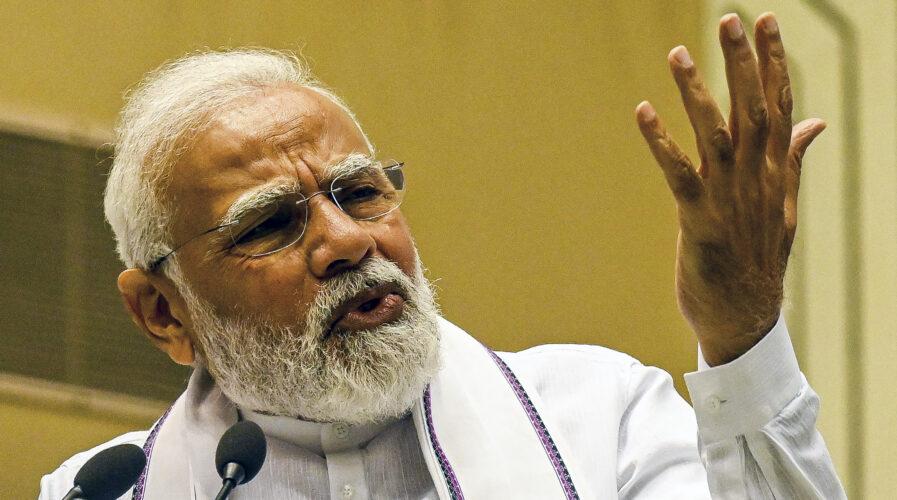
India’s Prime Minister Narendra Modi (Photo by Prakash SINGH / AFP)
India wants to be a leader in the semiconductor industry
- India wants to emerge as a key player in global semiconductor supply chains, urging companies to consider setting up.
- The push is part of Modi’s flagship “Make in India” project.
- The Indian semiconductor market was worth US$15 billion in 2020 and is expected to reach US$ 63 billion by 2026.
The semiconductor industry and almost every other industry continues to experience supply chain disruption. While the problem is mostly caused by the pandemic and geopolitical tensions, the demand for these materials are still increasing.
Over the last few weeks, manufacturing in China has been facing one of its biggest disruptions since the pandemic started. As the world continues to experience supply chain disruptions from China, India is now emerging as a strong alternative for manufacturers hoping to avoid these problems. China’s continued lockdown on major tech hubs and cities due to the COVID-19 pandemic is clearly impacting global deliveries.
While some companies have been able to manufacture their goods elsewhere, the reality is, that most major organizations have invested heavily in China for their manufacturing needs. Moving productivity to another factory in another country or state is not a simple process for some of them.
Manufacturers would need to look at cost implications as well as the support and capacity their alternative plants can provide them to deal with the disruption. One of the biggest moves in manufacturing was made by Foxconn.
The Apple supplier has moved some of its production to India. In fact, the new iPhone 13 model is currently being produced in India at Foxconn’s contract manufacturing partner. According to data shared by market intelligence firm CyberMedia Research (CMR), close to a million “make in India” iPhones have been shipped in the country.
As the mobile phone industry looks to manufacture its products in India, semiconductor companies are now also heavily exploring opportunities in the world’s largest republic. Some of the big names that may announce plant and investment plans in the subcontinent include Intel, TSMC, and Global Foundries.
Major semiconductor investments in India imminent?

Pat Gelsinger, Intel CEO. (Photo by ALEX WONG / GETTY IMAGES NORTH AMERICA / Getty Images via AFP)
According to a report by Bloomberg, the Indian government has been in talks with the semiconductor giants about setting up local operations. Last year, the government announced a US$ 10 billion incentives plan to lure display and semiconductor companies to set up base in India.
The Indian semiconductor market was worth US$15 billion in 2020 and is expected to reach US$ 63 billion by 2026. The government incentives and the demand for more chips both locally and internationally are pushing manufacturers to look into setting up hubs in the country itself.
With the lockdown seemingly ongoing in China and with the growing Chinese crackdown on big tech companies, some manufacturers may just be tempted to take up these offers, especially with the demand for semiconductors only increasing in recent times. Geographically, the country is also well-positioned to handle the heavy logistical demands the semiconductor companies require.
One of the biggest concerns for companies looking to set up their hubs in the subcontinent is the ability of the country to provide them with the necessary resources. This includes a sufficient power supply, water as well as a solid infrastructure. Interestingly, despite these concerns, Bloomberg reported that the country is working hard to gain the confidence of the chipmakers to set up their hubs there.
Last month, Pat Gelsinger, Intel’s CEO, was in New Delhi to meet the Indian Prime Minister, Narendra Modi. Reports showed that both parties had discussions on several subjects relating to technology, research, and innovation.
The Indian Prime Minister also announced at a conference recently that India wants to emerge as a key player in global semiconductor supply chains, urging companies to consider setting up. The push is part of Modi’s flagship “Make in India” project.
While it remains to be seen if any major announcements would be made soon, one thing that is for certain is India is beginning to establish itself as a dominant technology hub in the world. Not only is the country attracting semiconductors and phone makers, but it’s also becoming a booming market for the electric vehicle industry.
As such, the supply chain may just move from the east to the south of Asia. China may still be a strong force to reckon with when it comes to manufacturing, but the incentives and flexibilities provided for the semiconductor industry in India may just be more tempting and cost-saving for the manufacturers.
READ MORE
- Ethical AI: The renewed importance of safeguarding data and customer privacy in Generative AI applications
- How Japan balances AI-driven opportunities with cybersecurity needs
- Deploying SASE: Benchmarking your approach
- Insurance everywhere all at once: the digital transformation of the APAC insurance industry
- Google parent Alphabet eyes HubSpot: A potential acquisition shaping the future of CRM


